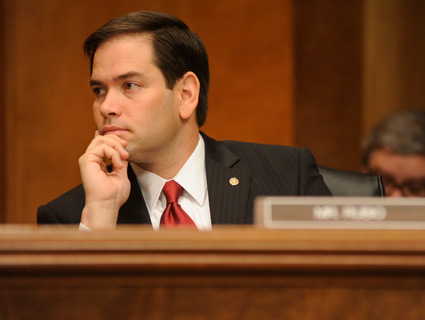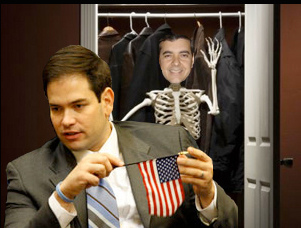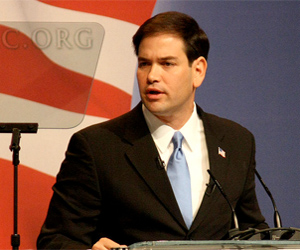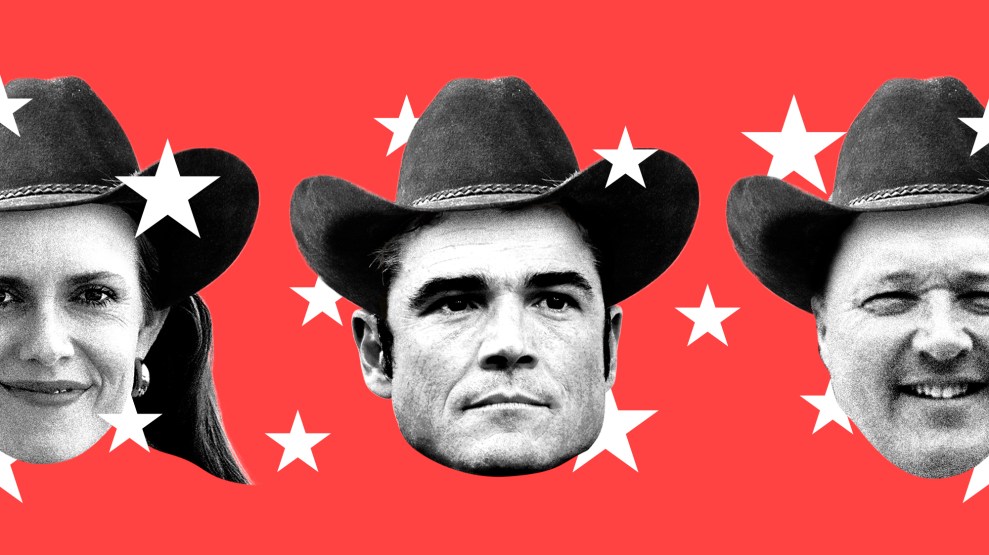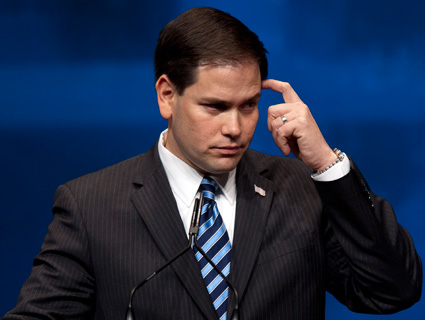
Pete Marovich/ZUMA
When it comes to Veepstakes 2012, one name towers above them all: Marco Rubio. The freshman Florida senator vaulted to national prominence when he rode the tea party wave to power two years ago. Team Romney sees a lot to like in Rubio: He’s Latino, young, fiercely conservative, from a battleground state, and backed by powerful political and corporate allies with names like Bush.
In recent weeks, Rubio has endorsed Romney, tagged along on the presidential campaign trail, and delivered a high-profile Brookings Institution speech calling for “a more forceful foreign policy.” (Apparently, wars in Iraq, Afghanistan, and Libya and sanctions on Iran and Syria aren’t forceful enough.) The Rubio-a-go-go has gotten so feverish that he consistently leads all vice-presidential hopefuls among Intrade oddsmakers and has even been called “this election’s Sarah Palin.“
But how well do you know the fresh-faced Floridian? Turns out he’s got a lot in common with Romney: He’ll say anything to pander to the right, even if it contradicts what he’s said before. Here are 10 facts about Rubio that might surprise you:
1) He is not the son of Cuban exiles. He thinks. Maybe? Up until last year, Marco Rubio described his parents as exiles from Fidel Castro’s communist regime in Cuba: “In 1971, Marco was born in Miami to Cuban-born parents who came to America following Fidel Castro’s takeover,” his Senate biography stated. But it turns out his parents actually arrived in the US in 1956, before the revolution, and even made multiple trips back to the communist island. Rubio insisted he hadn’t known his family’s actual history, but polls showed most of his constituents thought he’d “embellished” his account.
Things get even messier: According to a Rubio biography due out in June by Washington Post reporter Manuel Roig-Franzia, Rubio’s grandfather Pedro Victor Garcia was an illegal immigrant to the United States. Disillusioned by his financial prospects, Garcia reportedly left the United States for Cuba two weeks after Fidel Castro took power in 1959. He flew back to the States two years later without a visa…and was booked by a US immigration official, who stated: “[Y]ou do not appear to me to be clearly and beyond a doubt entitled to enter the United States.” Garcia was ordered deported, but instead he hung out illegally in Miami, resurfacing in 1967 to petition for permanent residency. Even though Garcia had been in the US since 1962, “The form he filled out then states that he had been a Cuban refugee since February 1965,” according to Roig-Franzia.
2) His immigration policies are…complicated. Rubio’s own vacillating positions on immigration parallel his grandfather’s back-and-forth homeland tryouts. He was one of the first Republicans nationwide to criticize Arizona’s SB1070, saying it would “unreasonably single out people who are here legally.” A week later, after some cosmetic changes were made to the law, Rubio said he would have voted for it. “Arizona’s going to do what’s in the best interest of the people of Arizona,” he said. “They have a right to do that, and I respect that.”
He also has spoken out against “blanket legalization” of undocumented immigrants and opposed President Obama’s DREAM Act: “People in the United States who are here without documents should not benefit from programs like in-state tuition.” But earlier this month—after joining Mitt on the campaign trail, and after being attacked in a political ad that stated 91 percent of Hispanics favor the DREAM Act—Rubio vowed to write on his own version of the legislation. (My colleague, Adam Serwer, has a rundown here on the Rubio DREAM Act’s weaknesses…and why it’s basically a canard.)
3) He’s Mormon. And Catholic. And Protestant. And…Like most Cuban-American Floridians, Rubio identifies himself as Catholic. But on moving with his family to Las Vegas in 1979, he converted to Mormonism. According to Roig-Franzia:
Marco attended LDS youth groups and often walked to chapel with his family because his mother could not drive. The cousins idolized the Osmonds…”Marco, his sister, Veronica, and their cousin, Michelle, liked to perform Osmond songs at family get-togethers. [Rubio] was so entranced by the Osmonds that he joined [a]…trip to Provo, Utah, to tour the pop group’s recording studio.
Rubio claims he returned to the Catholic church as a teen, on his family’s return to Miami. But since his Senate run, he’s also been a regular parishioner at a non-denominational Baptist-affiliated megachurch—and he’s been happy to let both churches embrace him and his “faith journey.“
In recent months, though, he’s denied that Mormonism was ever an influence in his life: “When you’re eight years old you do what your parents tell you to do.” In a separate interview, his cousin Michelle Denis told Buzzfeed, “He could convince his mom to do anything,” adding, “He was totally into [Mormonism].”
4) He’s a climate denier. Or an environmentalist. Or…As speaker of the Florida Legislature, Rubio shepherded a landmark bill to limit greenhouse gas emissions, voiced caution about drilling off the Sunshine State’s coast, and argued that climate change was real. “Global warming, dependence on foreign sources of fuel, and capitalism have come together to create opportunities for us that were unimaginable just a few short years ago,” he told his House colleagues in 2007. Of drilling, he said it should only be done if it could be proven environmentally safe, and it wasn’t a silver bullet: “Even if we started drilling tomorrow morning, it could take close to 10 years before we start seeing the benefits.”
But as soon as he jumped into the US Senate race, his love for Mother Earth faded. He stumped for a Palinesque pro-oil campaign called “Drill Here, Drill Now.” He ridiculed cap-and-trade emissions plans as “European-style” or “California-style” social engineering. And he attacked his Senate opponent, the moderate Republican-turned-independent Charlie Crist, as “a believer in man-made global warming.” “I don’t think there’s the scientific evidence to justify it,” he told the Tampa Tribune.
5) He charged a $134 haircut—or back wax?—to the GOP. Along with $109,000 of swag. For a fiscal conservative, Rubio’s pretty liberal with money. When he was state House speaker, the Republican Party of Florida issued Rubio and a few other party insiders corporate American Express cards…which they proceeded to burn up like a fresh can of Sterno…to the tune of $7.3 million. Rubio’s charges included a $134 bill from Churchill’s, a tony Miami hair salon “barbershop with $20 haircuts“; some critics have suggested Rubio used his card to pay for some special depilatory treatments.
Rubio insists he repaid American Express for personal expenses amounting to $16,000, but that leaves $94,000 that the party picked up—including repairs to his family minivan, thousands for a personal car rental, a Disney World vacation, tons of air travel, and repeat trips to a convenience store around the corner from the Rubio homestead. Politifact tried to parse out what the party paid for—a full listing of the charges is here—but the GOP’s paperwork was in disarray. It doesn’t help that the state party chairman at the time is currently in jail for skimming off the top from GOP accounts.
6) He’s got friends in low places. Throughout his political career, Rubio’s been called a corrupt wheeler-and-dealer by everyone from the Florida Democrats to Mitt Romney’s press secretary (see No. 8 below). Perhaps it’s the company he keeps. He’s been something of a mentor to Rep. David Rivera (R-Fla.) since they came up together in the state Legislature—they went in together on a house in Tallahassee, which went into foreclosure when they failed to pay the mortgage. Rivera—who once forced an opponent’s campaign truck off the side of an interstate highway with his car—is now under state and federal investigations for a spate of financial corruption allegations, mostly focusing on nepotistic lobbying.
That’s something Rubio would know about from his days running Floridians for Conservative Leadership, a political committee that at one time or another employed Rubio’s mother-in-law and three other members of Rubio’s wife’s family. His wife was the treasurer; between them, they failed to report $34,000 of contributions in an 18-month period.
He’s also enjoyed a cozy relationship with state Rep. Esteban Bovo, who’s a lobbyist by day, and Bovo’s wife, also a lobbyist, who ended up on a couple of air trips with Rubio that were charged to that GOP credit card. Another young health care lobbyist, Amber Stoner, also shows up as a recipient of 10 paid flights with Rubio on his Republican Amex.
It goes deeper, but trying to untangle Rubio’s lobbyist and dark-money connections is like trying to flowchart Whitewater and Iran-Contra while eating spaghetti with chopsticks outside, at night, in the middle of a hurricane.
7) He had 100 bright ideas to fix Florida, which mostly fixed his friends’ finances. In making his 2006 bid to be the No. 1 Republican in Florida’s statehouse, Rubio touted a book he’d written, 100 Innovative Ideas for Florida’s Future, as a blueprint for legislative action. Rubio later claimed that 57 of his ideas were made into law by the Florida Legislature; Politifact found only 24. Some, like whistleblower protection for prostitutes who snitch on their pimps, never saw the light of day in the Legislature.
Rubio also started a nonprofit foundation and website, 100ideas.org, to solicit more ideas, though it’s unclear what the organization accomplished, beyond padding the pockets of a few political allies. Much of 100ideas.org’s roughly $100,000 a year of funding went to the political consulting firm that set up and ran the nonprofit: Frontline Strategies, a boutique outfit run by the Bush-Cheney 2004 campaign’s Florida director. 100ideas.org’s president, William Holly, is a Miami real estate developer who got his start working for the Codina Bush group, a firm co-owned by Jeb Bush. Holly’s and Bush’s business interests benefited greatly from Rubio’s anti-tax “ideas” in the statehouse. (After Rubio left for Washington, it seems Holly’s fortunes soured; he declared bankruptcy just last month, after creditors won more than $40 million in foreclosure judgments against him.)
8) Mitt’s spokeswoman has called Rubio “a wheeling and dealing Miami lobbyist and politician, always trying to scam the system for his personal benefit.” Before stumping for Romney, national press secretary Andrea Saul was the communications director for Crist, Rubio’s Senate opponent, and she assailed Rubio as “another typical politician.” Her biggest knock against the Florida House speaker: “With each passing day, voters are beginning to see the real Speaker Rubio, a tax raising Miami lobbyist-politician who has used public office for personal gain and political donations as a personal slush fund.” Asked by ABC’s Jonathan Karl about her comments, Saul declined to respond.
9) He called Barack Obama a socialist before it was cool. Back in early September of 2008—before the presidential election, and before the economy fell off a cliff—Rubio said “Marx would be pleased” by Obama’s fiscal proposals. “I love what Barack Obama’s candidacy says about America. I just fear what his candidacy would do to America,” he said. “To leave our children with a centrally planned socialist economy is not a better plan.”
10) He endorsed Huck in 2008. And Huck endorsed him in 2010. And 2012. Seeking to raise his profile, Rubio (and buddy David Rivera) threw their support behind populist conservative Mike Huckabee’s unsuccessful bid for the GOP presidential nomination. Huckabee returned the favor, endorsing Rubio for Senate—and, more recently, for vice president. What’s the source of the synergy? Huckabee was a real genuine guy, Rubio said in ’08, and “people are looking for genuineness and sincerity in politics.”
UPDATE: Great minds think alike! For more tidbits on the Florida senator’s collegiate football career, cheerleader wife, and hatred of disco, check out The Week’s “8 Surprising Facts About Marco Rubio.“
